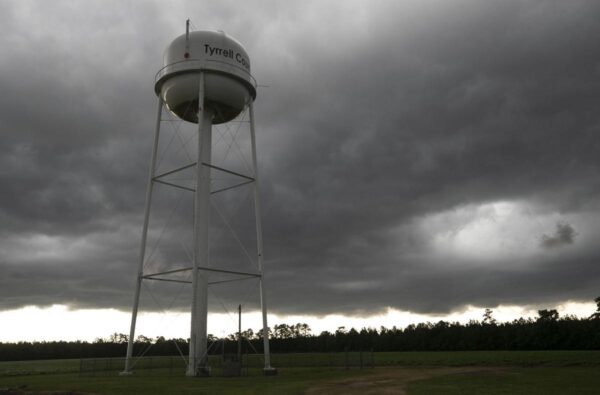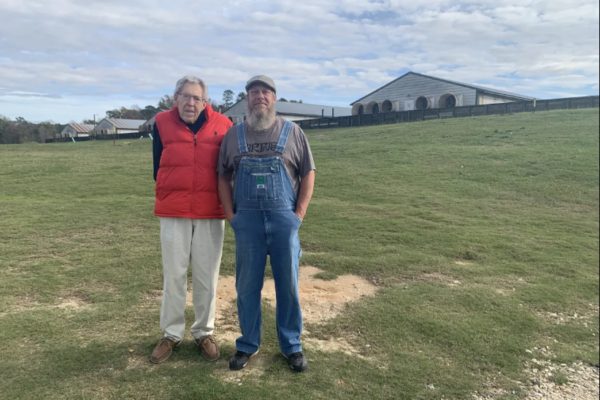By: Kevin Griffin, Hickory Daily Record | N.C. News Collaborative
August 7, 2020
This spring, Tyrrell County, with the smallest population in the state, came within 24 hours of defaulting on a bond issued to build one of its water plants.
The state stepped in and helped make the payment, but county leaders don’t know how they will make the next one. The county’s biggest water customer, a state prison, closed last fall.
Tyrrell County is one of dozens of small, rural governments managing utility systems teetering on bankruptcy. The cost of running an aging water system or paying vendors for needed electricity often outstrips the shrinking communities’ ability to pay.
The coronavirus pandemic has pushed some to the brink. Thousands of customers haven’t settled their bills — taking advantage of a four-month reprieve, extended by the governor, forbidding utility providers from shutting off service. Closed businesses, another casualty of the pandemic, also strained the systems.
“This crisis, this pandemic, has created its own set of problems but basically it’s layered those problems on top of some already existing problems for a number of small, rural municipal systems out there,” said Scott Mooneyham, director of political communications and coordination for the North Carolina League of Municipalities. “They’ve become overwhelming in some places.”
Tyrrell County Commission Chairman Tommy Everett is blunt about the state of his community: It’s in trouble. About 20% of customers haven’t settled their bills since the start of the pandemic.
The governor’s reprieve for utility customers ended last week, though private utility companies are still blocked from disconnections until September.
. Local governments will now begin collecting the money owed for months of water or electricity. Officials will see money trickle in over months through payment plans, prolonging the time they will need to float the system.
“And now I have to put those people on a six-month payment plan,” Tyrrell County Manager David Clegg said. “Well, the people I’m buying all the stuff from to run the system, they’re not putting me on a six-month payment plan.”
Anatomy of a Crisis
Tyrrell County sits in the northeastern corner of the state, tucked between the mainland and the Outer Banks. Roughly 4,000 people make a home here, and its population has been aging and shrinking for years.
More troubles arrived in the county last year, months before COVID-19 began ravaging the country.
Last fall, the state closed the Tyrrell Prison Work Farm, a 200-acre facility that housed up to 620 inmates. State officials said they closed it because of staff shortages.
But with the prison went the water system’s biggest customer. Its monthly bill often topped $25,000 and accounted for about a third of the system’s water consumption.
Clegg said the county got no warning from the state about the shutdown.
The first notification to county leaders came from “shaken citizens” who heard about it from media reports, Clegg said.
“The calls we received from a Department of Public Safety deputy was a call back, not a notification,” he said.
For more than 20 years, the prison has been central to the county’s economy.
The prison was so key that leaders of the small county issued $3.5 million in bonds to pay for the construction of a new water plant for the prison.
As long as the prison remains closed, Tyrrell County leaders are left with nothing but bad options.
Raising revenue is limited.
A little more than half of the county’s land cannot be taxed because it belongs to either the federal or state government, Clegg said.
The economy is based on farming, fishing and forestry — economic activities that do not tend to produce highly lucrative land values.
Clegg suspects the county will need to raise water rates, burdening a community already plagued by high unemployment and poverty.
The county is now consulting with the state over how to implement payment plans before it makes the decision on rate hikes, Clegg said.
He estimated a potential rate increase of 10%. The average monthly water and sewer bill in Tyrrell County is about $50, according to the School of Government Economic Finance Center at the University of North Carolina at Chapel Hill.
The unemployment rate in Tyrrell County spiked to around 14% this spring, according to the N.C. Department of Commerce Labor and Economic Analysis Division.
The Rev. Randy Hughes, pastor of the Assembly of Praise, has seen the strains in Tyrrell County first hand. More than 300 people have come to his church for help with food.
“Some of the people that’s coming to get the food have been known by our church members a long time, and they say, ‘You know, times must really be tough for them to be coming because pride would have kept them away in the past so they must really need it,’” Hughes said.
Different communities, similar problems
By June, Elizabeth City officials had grown impatient with the governor’s reprieve to utility customers.
City leaders announced they would defy the governor’s order forbidding disconnections and late fees.
The city in northeastern North Carolina applied for a waiver from the governor’s order, asking to put customers on payment plans before the moratorium on disconnections ended. City leaders said the power to shut off utilities is necessary.
“Unfortunately, disconnection is a tool we have to use to have our customers pay their bills,” Elizabeth City Mayor Bettie Parker wrote in a letter to North Carolina Attorney General Josh Stein, asking for leniency to begin collecting on unpaid bills.
Had relief not been granted, the city would have had its own unpaid bill. Elizabeth City Manager Richard Olson said the city would have not been able to pay its electrical supplier in August without the payments from customers.
The city has lost roughly $2 million in total utility revenue. More than 2,700 customers, about one in five, have not paid their bills since the pandemic began, Parker wrote in the letter to Stein.
Stein eventually granted the waiver and approved alternative payment plans for overdue customers whose hardship relates to COVID-19.
Jamita Howard, 30, is months behind on her electric bill in Elizabeth City. The bills started piling up after she had to quit her job at a nursing home to tend to her six children when schools closed.
“This is a bill I absolutely worry about paying,” Howard said. “I can’t go without lights.”
She is nervous the city will take a heavier hand with her now that the governor’s reprieve has lapsed. She said her outstanding tab is more than $1,600.
“Unless you’ve experienced something like this, you just can’t know. On the outside, I try to put on a brave face for my kids,“ she said.
Other towns in the state say businesses, not residents, are hurting their revenues. The pandemic shuttered many businesses, greatly reducing the amount of water being used.
In the city of Brevard, a tourist town of about 8,000 an hour south of Asheville, water sales dropped about 20% since the pandemic. City Manager Jim Fatland blames the drop on hospitality businesses closing.
If the problem persists, Fatland said, the city’s water system is facing a shortfall of $1.2 million.
The drop is ill-timed. The community is on the hook for its annual debt payment of nearly $1.5 million in May for more than $20 million worth of loans needed to upgrade its water and sewer system.
Fatland said he sent a letter to the state treasurer’s office asking for the state to defer principal payments on the town’s debt for at least a year.
Uncertain present, uncertain future
Towns got into the business of water and sewer in the 1970s when sanitation became a public health crisis. In those years, federal and state governments doled out billions to help build the infrastructure, Kim Colson, director of the Division of Water Infrastructure for the state Department of Environmental Quality, told a group during a presentation at the North Carolina Rural Center this spring.
The systems were designed to stand on their own. Customers pay for what they use, with enough left over to cover repairs.
But the design has not withstood the tests of time and the changing economies of rural North Carolina, Colson said. The aging systems need costly repairs, and government grants are now mostly loans. Across the state, the customer bases have declined as residents migrate to cities and large businesses close.
“A lot of our communities are kind of in that downward spiral because of these water infrastructure issues,” Colson said.
The Department of Environmental Quality had more than $800 million in requests this spring for loans to repair local water systems, Colson said. Many of the towns are so small they can’t raise rates enough to cover the annual loan payments.
The state treasurer’s office keeps a list of towns, counties and utility districts that are in financial distress. In the last two years, 152 made the list. Of them, 36 have high risk of solvency issues because of their water and sewer systems.
State Treasurer Dale Folwell said rural areas in North Carolina are particularly vulnerable.
“The larger communities … they got more property tax base. They got more sales tax base. They’ve got more of all the bases necessary to put it all together to run their budgets,” Folwell said.
If it must, the treasurer’s office steps in to rescue a town’s public water system.
In June, legislators approved $9 million to help failing local water systems with repairs and to help if the state must step in.
Mooneyham said the legislation provided “a framework to at least begin to address this problem,” but described the appropriated amount as a “drop in the bucket.”
Leaders in Tyrrell County said they will need more of the state’s help to withstand its crisis.
“Well, I think the state needs to be writing a check to the counties to make sure that their utilities systems are operating because if not you’re going to have a worse public health crisis on top of a pandemic,” Clegg said.
There’s also the question of what, if any, additional relief the federal government will make available to local governments.
The CARES Act — the coronavirus relief package passed by Congress in March — did supply some funding for local governments, but the money came with significant restrictions.
Local governments were prohibited from using that money to replace lost revenue, Mooneyham said.
For Clegg, the bottom line is he needs more money and more flexibility to use it.
As discussions in Washington continue over another possible relief package, he said being able to use funding to make up for lost revenue is a must.
Clegg is eager for another form of relief as well: the reopening of the prison.
Its fate, however, remains uncertain, said John Bull, a communications officer with the Department of Public Safety.
Will the prison reopen? If it does, how many prisoners will be housed there?
At the moment, those questions — like so many others in Tyrrell County — remain unanswered.





